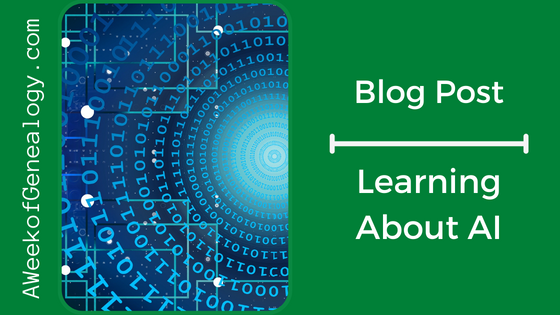Learning About AI

Have you wanted to learn more about Artificial Intelligence?
Recently I gave a talk about Using AI for Genealogy, and shared some of my sources for education about AI. You can find out more about the talk and if you want to learn from a genealogist who is a professor with a Ph.D. in Computer Science and Engineering, you might consider having your group book it.
There are many resources available to learn how to get started with generative AI, and some ideas for using it in genealogy. Among them are posts on this blog .
NOTE: DO NOT put any sensitive information into any AI tool.
The first recommendation is a paper that you can download. Genealogists need to learn about prompt engineering to use AI tools effectively. A great paper that offers a catalog of prompt patterns is a good place to start. These prompts presented in the paper are general in nature, but they can be applied to genealogy. The paper is “A Prompt Pattern Catalog to Enhance Prompt Engineering with ChatGPT.” It is an academic paper, and they can look intimidating, but they do not have to be! You can copy-and-paste parts of it into ChatGPT (or another text-to-text AI tool) and ask it to create a summary or explain it. My specific advice is to look at the tables labeled “Contextual Statements” to learn the patterns. I actually copied text from these tables, and combined information about the patterns offered by a generative AI to create a personal cheat sheet.
If you want to dig deeper and understand more, you may want to look beyond genealogical applications and learn about the technology. Understanding what the tools are and how they work might help you be more comfortable with using them and applying them in genealogy.
In its “AI Ready” commitment, Amazon Web Services (AWS) has set a goal to train 2 million people. As part of this commitment, AWS offers free courses about AI. These courses are written for all different levels of knowledge. From the AWS webpage describing the commitment, scroll down to the section “Courses for business and nontechnical audiences” where you can follow the links to register for the courses. A free account is needed. “Introduction to Generative Artificial Intelligence” is a good starting point, with simple and understandable explanations and no formal assessments. (That means no tests!)

If you want to learn in a more structured way, there are online classes available. These are more formal, with structured lessons and activities that you have to turn in. That should not intimidate you, as these courses are designed for beginners who have little or no technical background. The beginner aspect should not dissuade people with more experience, as there is always something to learn in courses like these. I enjoyed the first and simplest course on the list, as well as courses in the series “Generative AU Learning Planning for Decision Makers” and the “Foundations of Prompt Engineering.”
Coursera
Coursera offers “Prompt Engineering for ChatGPT.” It is taught by the professor who wrote the article that I recommended. If you take this course for free, be sure to allocate time for it each week because the course materials are only available to paying participants after the end of the class. I found this to be a very enjoyable course, with the assignments being as simple as using ChatGPT 3.5 to try the patterns from lessons and submitting the prompt and response via a text box.

GALE Courses
Another course that I have begun is “Introduction to Artificial Intelligence” on GALE Courses (formerly known as Learn4Life). GALE Courses may be available from your local library website, or from a neighboring county for free by using a library card they issue. For those in Anne Arundel County, Maryland, you will find GALE Courses offered by the Howard County Public Library, so get a library card from them. (At Howard County Public Library this is the link to the description https://education.gale.com/l-howardmain/online-courses/introduction-to-artificial-intelligence/?tab=detail). These are 6-week courses, organized into two lessons per week, and there are discussion boards and ungraded quizzes. In order to obtain a certificate for this course, you have to pass a final containing multiple choice questions that appears to be based on the ungraded, optional quizzes for each lesson. Check on your library’s website for an alphabetical listing of online resources or contact a librarian.

This is a technology course about the science of how a computer can perform tasks that usually require human intelligence. It covers the forms of AI, how AIs learn, AI applications and ethics. It will not be something that you can use immediately for genealogy, but it will give a foundation as we go forward seeing more and more AIs.
No matter how you decide to learn, keep learning!
Let me know how you are learning about AI.
NOTE: I have no affiliation with any of the courses or services in this post.



